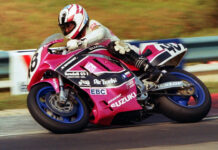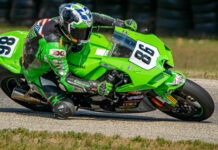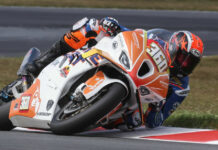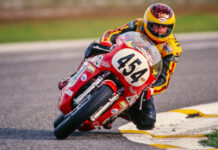The Sizzle and the Steak
When Kawasaki launched the 1973 Z1, it was more than just a bigger, better streetbike. It was both velvet glove and sledgehammer, all in one.
Irvine, California — They called it “New York Steak.” That was the internal code for Kawasaki’s earthshattering 1973 Z1, the world’s first four-cylinder DOHC production superbike. Whereas previous Kawasaki streetbikes had carried names like Samurai, Avenger and Mach III, the new model was so big, so powerful and so commanding, that “Z1” just said it all.
Several crucial factors led to the development of the big Z1, a huge undertaking for a company that had previously focused on two-strokes. First was that manufacturers of two-stroke road engines were facing challenges due to new United States emissions laws; second was that Kawasaki project leader Sam Tanegashima believed a premium four-stroke engine would look and sound more substantial than any two-stroke; third was a keen desire to further expand Kawasaki sales and market influence; and fourth was that a certain Japanese competitor had already launched a four-cylinder bike.
The Z1 was originally developed as a 750cc model, but the changing market meant a bigger bike would be a better competitor. So the original design was revised for greater displacement. Engineers pushed it to the maximum, eventually determining that 903cc was the largest displacement that could be integrated into the existing design. The final production engine’s output was pegged at 82 horsepower at 8,500 rpm – dramatic in a day when anything over 50 hp was considered robust. It was tested to extremes, with thousands of high-speed miles ridden by Yvon Duhamel, Bryon Farnsworth and others at Willow Springs and Talledega, across America and in Japan.
Everything about the Z1 was supersized, from its robust engineering and displacement to its roomy seating, and from its big chrome-plated megaphone exhausts to its linkless 630 drive chain, the largest ever fitted to a production bike. In a time of escalating street performance, for $1,995 the Z1 was ready for anything – from the morning commute to pushing a touring fairing across the prairies, to carving up the backroads or scorching around the racetrack. It is no wonder that the Z1 developed such a huge following, so fast.
Some interesting Z1 trivia: the intricate roller-bearing crankshaft was built up from nine separate pieces; the enormous drive chain had an automatic oiler with a dedicated tank and pump; the Candy Brown paint scheme was developed by Rollin Sanders (“Paint by Molly”), who also invented Kawasaki’s iconic Lime Green color; and in Cycle magazine’s historic 1973 Superbike shootout, the Z1 topped every other competitor by hitting a record 110.70 mph through the dragstrip lights. Meet the new boss!
Over four decades ago, the success of the Z1 propelled Kawasaki to the forefront of motorcycle engineering, with its robust platform establishing a platform for dozens of important models to follow. The Z1 also built the feisty “Z” brand heritage within Kawasaki that continues today with the Z1000, Z800 and Z125 PRO motorcycles.
The Sizzle and the Steak live on.
ABOUT KAWASAKI
Kawasaki Heavy Industries, Ltd. (KHI) started full-scale production of motorcycles over a half century ago. The first Kawasaki motorcycle engine was designed based on technical know-how garnered from the development and production of aircraft engines, and Kawasaki’s entry into the motorcycle industry was driven by the company’s constant effort to develop new technologies. Numerous new Kawasaki models introduced over the years have helped shape the market, and in the process have created enduring legends based on their unique engineering, power, design and riding pleasure. In the future, Kawasaki’s commitment to maintaining and furthering these strengths will surely give birth to new legends.
Kawasaki Motors Corp., U.S.A. (KMC) markets and distributes Kawasaki motorcycles, ATVs, side x sides, and Jet Ski® watercraft through a network of approximately 1,100 independent retailers, with close to an additional 7,700 retailers specializing in general purpose engines. KMC and its affiliates employ nearly 3,100 people in the United States, with approximately 300 of them located at KMC’s Irvine, California headquarters.
Kawasaki’s tagline, “Let the good times roll.®”, is recognized worldwide. The Kawasaki brand is synonymous with powerful, stylish and category-leading vehicles. Information about Kawasaki’s complete line of powersports products and Kawasaki affiliates can be found on the Internet atwww.kawasaki.com.






